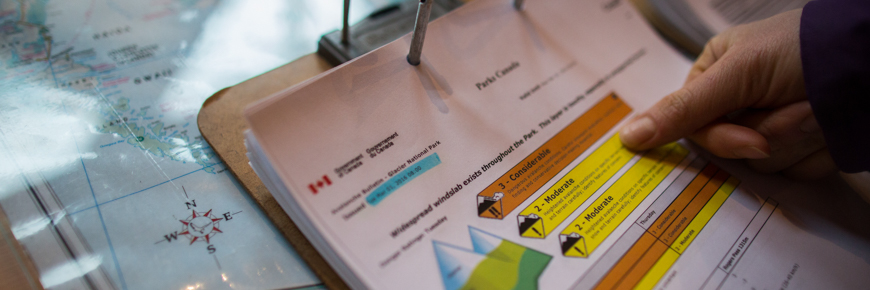
Visitor safety
Mount Revelstoke National Park
Most requested
We rarely head out for an adventure with the expectation that something will go wrong, and most times everything will go right. But sometimes the unexpected happens.
Natural hazards are a part of the national park experience. You can reduce the impact of an unfortunate circumstance by being well informed and well prepared.
For general information on how to stay safe when enjoying the outdoors visit AdventureSmart.ca. For important information about safety while enjoying the mountain national parks, explore the topics below.
Featured topics
General safety tips
Follow these tips to ensure a safe trip.
Wildlife hazards
Any wild animal can be dangerous. Even ground squirrels deserve distance and respect!
Bear safety
Although the chances of having an encounter with an aggressive bear are low, proper planning before you head out can help reduce your risk.Winter activities
Ski touring
If you plan to tour in Glacier National Park, be aware that many areas of the park have restricted and prohibited access in winter.
Avalanche information
Avalanches are the most significant threat to the safety of anyone recreating in the uncontrolled mountain backcountry during the winter months.
Winter weather
There’s a saying in the mountains – if you don’t like the weather, wait five minutes.
Summer activities
Mountaineering / alpine climbing
The Mountain National Parks are a mountaineer’s smorgasbord with hundreds of peaks and countless routes ranging from straightforward glacier walks to never-repeated Grade VI alpine test pieces.
Trad climbing
The Rogers Pass area of Glacier National Park offers many long, easy to moderate ridge climbs on solid quartzite.
Scrambling
There are more good scrambling peaks in the Mountain National Parks than you can shake a ski pole at.
Summer weather
Make sure you are prepared for both sun and snow - and everything in between.
Resources
Weather
Current weather in Revelstoke, BC
Trail conditions
Please check our Trail Condition Report for the latest trail updates.
Avalanche bulletin
Avalanche bulletins are compiled by Avalanche Forecasters based on data they collect in the field on a daily basis.
Safety is everyone's responsibility. At Parks Canada, we do our part to make sure you can have a safe visit by assessing the risks, managing hazards, and making sure that safety information is freely available to everyone. You can do your part by seeking out the information you need to stay safe and make well informed decisions while enjoying these special places. Visit our websites and stop at a Visitor Centre for the most up to date information. Make sure you are fully prepared for whatever activities you choose to participate in so you can have a safe, enjoyable and memorable visit.
Emergency
- Call 1.877.852.3100 for Parks Canada Dispatch. Tell dispatchers you have a backcountry emergency and require assistance.
- Call 911 for Police, Fire or Ambulance.
Cell coverage is limited and there is no WiFi in the park.
Backcountry beacons
Devices such as "SPOT" or "inREACH" and satellite phones are often the only devices that work in the backcountry. Your adventure is not the place to learn how to use your emergency device. Be familiar with it and understand the difference between the “SOS/Emergency” and “Messaging” functions. Pre-enter your messages and tell your contact person how to reach Parks Canada in case of an emergency.
Reporting wildlife
Identify the species with care and note the animal’s description, behaviour and location. Report to Parks Canada: 250.683.2616 or mrg.wildlife-faune.mrg@canada.ca.
- Date modified :